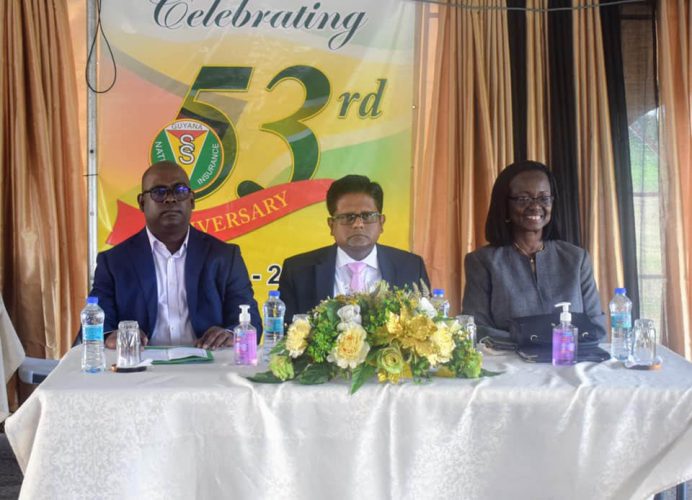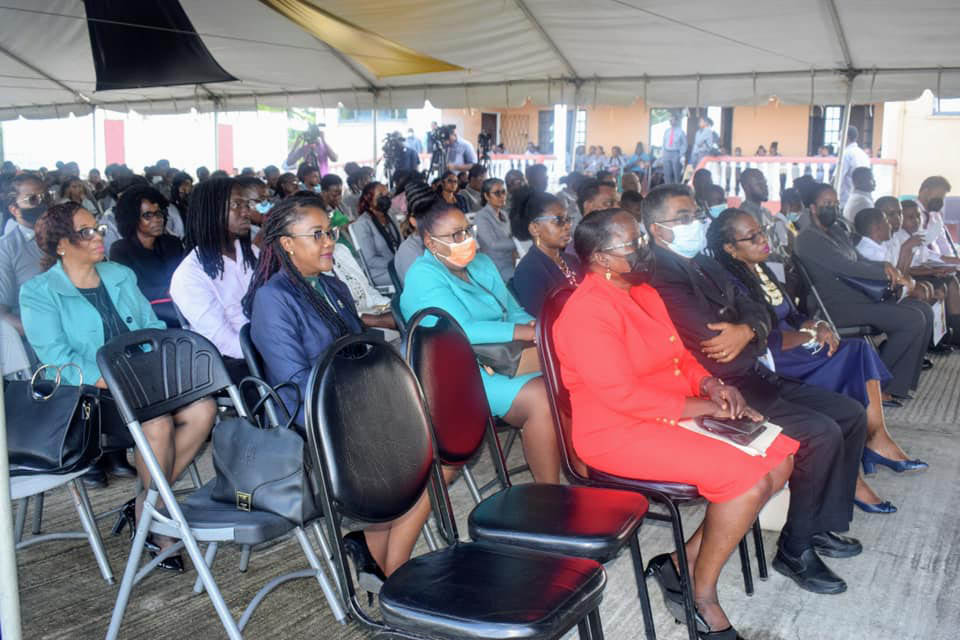Much more remains to be done even as the National Insurance Scheme (NIS) has made tremendous strides in the delivery of its service and processing of claims, Senior Minister in the Office of the President with responsibility for Finance, Ashni Singh said on Tuesday.
He was at the time addressing a gathering during the observance of the Scheme’s 53rd anniversary celebrations at the NIS ground, Carifesta Avenue, Georgetown.
He reminded staff members that they have an obligation to serve the most vulnerable in society.

“Nobody walking into an NIS office should be treated with disrespect or contempt. Nobody walking into the office should be told ‘you ain’t see we closed for lunch? Come back just now’…”
In his remarks he stated that from working with offices during outreaches across the country, he has come to admire the number of dedicated and hardworking people within the system.
“The progress that we have made, much more remains to be done…” the Minister said while highlighting the fact that when the agency came under the chairmanship of Ramesh Persaud, it had some 14,000 claims to process. The majority of them have been processed with approximately 1,000 remaining to be dealt with.
Although they have embarked on several outreaches across the country in a bid to improve their services, Singh urged the agency to be more diligent in executing its functions. He shared the view that should the agency become more efficient in processing claims and addressing enquiries in a timely manner, they will be able to eliminate outreaches.
Nonetheless, he noted that the enquiries have yielded successes as they were able to see more than 1,500 persons. One of the highlights, he recalled, was the fact that they were able to sort out the issues of two persons in their nineties to help them receive their benefits.
The minister used the opportunity to encourage workers to constantly check contributions made by their employers to the NIS.
He informed that if these checks are done regularly, employees will be able to detect any discrepancies and have it sorted out in real time.
According to the minister, in many instances employers are to be blamed for not submitting the contributions of employees.
“I know that in many cases, the problem doesn’t originate in the NIS. You have employers who are not deducting or not remitting deductions and as a result you have gaps in the contribution record”, he said.
Singh also pointed out that in some cases, employers submit incorrect information to the NIS making it much more difficult for the agency to track beneficiaries’ contributions. He also cautioned employers that failing to remit employees’ contributions to the agency is a criminal act.
On this note, he advised every current employee to check their records to allow for real-time clarification.
But even so, Singh challenged the NIS and its Board of Directors to clean up the suspense account which contains information on beneficiaries who cannot be found, clear the backlog of claims, and inform all paying contributors of their status.
“We have to ensure we remain up to date, we can’t wait 20 years later to reconcile 2001 transactions, much less 2017 and 2018. Some of these employers have closed down, they don’t exist, we can’t find them,” he noted as he urged the agency to work to remain current.
And to further assist in bringing contributors’ contributions current, Singh called for the continuous delivery of statements of contributions. This system which was implemented some years ago, updates employees annually on their contributions to the scheme. He posited that it will assist in apprising contributors of their annual contributions.
“I’m asking you to reinstitute this practice. As a matter of fact, every contributor should get a statement every year. Every contributor should get a statement once a year and be encouraged to regularise and fix any gaps that they observe.”
On this note, he told the agency and its board of directors that much more needs to be done through the use of technology and at a faster rate.
“I have been repeating on an ongoing basis… this government expects rapid improvement in the quality of service provided by the National Insurance Scheme… sometimes we have to hit pause and [question] are we really providing the kind of service that we should be providing?”
Singh reminded the agency that when it was established in 1969, it was to provide an avenue of welfare for those who are unable to work, arm employees with medical insurance, and provide assistance after employment.
“This is the institution in which you are in today’s cohort managing and so when a pensioner comes into an NIS office we have a longstanding obligation to serve them in a particular manner driven by the high ideals of public service,” he reiterated.
He informed that over the last year, the board has looked at over 1,300 appeals. He reminded that while it might not always be in favour of a claimant, they are compelled to operate in accordance with the medical advice given.
“Our goal is to reach a technological efficiency, enhance financial sustainability, and develop skilled and motivated staff. The board will work with management and all stakeholders to ensure these strategic objectives are achieved within the timeframe”, he added.





